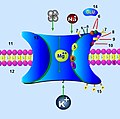Channel blocker
Channel Blocker[edit]
A channel blocker is a type of medication that works by blocking specific channels in the body, thereby affecting the flow of ions or other substances. These blockers are commonly used in the treatment of various medical conditions, including heart disease, high blood pressure, and certain types of arrhythmias.
Mechanism of Action[edit]
Channel blockers work by binding to specific channels in cell membranes, preventing the passage of ions through these channels. By blocking the flow of ions, these medications can alter the electrical activity of cells and tissues, leading to various physiological effects.
Types of Channel Blockers[edit]
There are several types of channel blockers, each targeting different channels in the body. Some common types include:
- Calcium Channel Blockers: These medications block calcium channels in the heart and blood vessels, leading to relaxation of blood vessels and decreased heart rate.
- Sodium Channel Blockers: These medications block sodium channels in nerve cells, affecting the transmission of electrical signals and reducing excitability.
- Potassium Channel Blockers: These medications block potassium channels in the heart, affecting the repolarization of cardiac cells and regulating heart rhythm.
Medical Uses[edit]
Channel blockers are used in the treatment of various medical conditions, including:
- Hypertension: Calcium channel blockers are commonly prescribed to lower blood pressure by relaxing blood vessels.
- Arrhythmias: Sodium channel blockers are used to treat certain types of irregular heart rhythms.
- Angina: Calcium channel blockers can help relieve chest pain by dilating coronary arteries.
- Migraines: Some potassium channel blockers are used in the prevention of migraines.
Side Effects[edit]
Like all medications, channel blockers can cause side effects. Common side effects may include dizziness, fatigue, constipation, and low blood pressure. It is important to consult a healthcare provider before starting any new medication.
-
Tetrodotoxin structure
-
Potassium Channel Mechanisms
-
NMDA receptor
Ad. Transform your life with W8MD's Budget GLP-1 injections from $75


W8MD offers a medical weight loss program to lose weight in Philadelphia. Our physician-supervised medical weight loss provides:
- Weight loss injections in NYC (generic and brand names):
- Zepbound / Mounjaro, Wegovy / Ozempic, Saxenda
- Most insurances accepted or discounted self-pay rates. We will obtain insurance prior authorizations if needed.
- Generic GLP1 weight loss injections from $75 for the starting dose.
- Also offer prescription weight loss medications including Phentermine, Qsymia, Diethylpropion, Contrave etc.
NYC weight loss doctor appointmentsNYC weight loss doctor appointments
Start your NYC weight loss journey today at our NYC medical weight loss and Philadelphia medical weight loss clinics.
- Call 718-946-5500 to lose weight in NYC or for medical weight loss in Philadelphia 215-676-2334.
- Tags:NYC medical weight loss, Philadelphia lose weight Zepbound NYC, Budget GLP1 weight loss injections, Wegovy Philadelphia, Wegovy NYC, Philadelphia medical weight loss, Brookly weight loss and Wegovy NYC
|
WikiMD's Wellness Encyclopedia |
| Let Food Be Thy Medicine Medicine Thy Food - Hippocrates |
Medical Disclaimer: WikiMD is not a substitute for professional medical advice. The information on WikiMD is provided as an information resource only, may be incorrect, outdated or misleading, and is not to be used or relied on for any diagnostic or treatment purposes. Please consult your health care provider before making any healthcare decisions or for guidance about a specific medical condition. WikiMD expressly disclaims responsibility, and shall have no liability, for any damages, loss, injury, or liability whatsoever suffered as a result of your reliance on the information contained in this site. By visiting this site you agree to the foregoing terms and conditions, which may from time to time be changed or supplemented by WikiMD. If you do not agree to the foregoing terms and conditions, you should not enter or use this site. See full disclaimer.
Credits:Most images are courtesy of Wikimedia commons, and templates, categories Wikipedia, licensed under CC BY SA or similar.
Translate this page: - East Asian
中文,
日本,
한국어,
South Asian
हिन्दी,
தமிழ்,
తెలుగు,
Urdu,
ಕನ್ನಡ,
Southeast Asian
Indonesian,
Vietnamese,
Thai,
မြန်မာဘာသာ,
বাংলা
European
español,
Deutsch,
français,
Greek,
português do Brasil,
polski,
română,
русский,
Nederlands,
norsk,
svenska,
suomi,
Italian
Middle Eastern & African
عربى,
Turkish,
Persian,
Hebrew,
Afrikaans,
isiZulu,
Kiswahili,
Other
Bulgarian,
Hungarian,
Czech,
Swedish,
മലയാളം,
मराठी,
ਪੰਜਾਬੀ,
ગુજરાતી,
Portuguese,
Ukrainian


